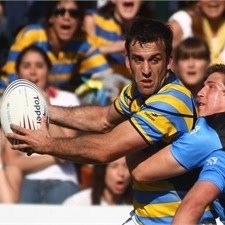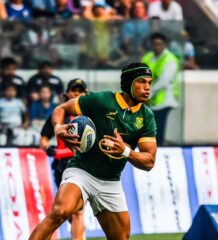A year of ups and downs for Argentina
Argentine rugby will look back to 2013 with some bittersweet memories. Los Pumas had an underperforming season – two wins in 12 internationals – but it came as a good wake-up call two years away from Rugby World Cup 2015.
On the other hand, the growth at grass-roots has been sustained and the UAR high performance units around the country continue to produce new players for the future.
Some good stories came out of the season that in Argentina is slowly coming to an end, with only a handful of Rugby Sevens tournaments left to close 2013.
No try – don’t bother the TMO
The final of the Buenos Aires Rugby Championship is always a huge event. First played in 1899, it is the biggest of club championships in Argentina and possibly the oldest in the world, with more than 80 teams divided into five divisions.
A lot has already been written about how the club game underpins the sport in a country that has more than 110,000 players so the scene set for this final was incredible.
As it turned out Club Universitario de Buenos Aires won a nail-biting final, 11-9, with a long-range penalty in the last second, ending a 43-year gap with no championship wins. They had to beat Hindú Club, arguably the best club side in the Americas, who had won each final it had played, the first being in 1996.
Hard but fair, this was a game in which no quarter was given, or taken. In the first half, a deep Hindú attack saw former Puma Francisco Bosch enter the in-goal and it was unclear under the pile of players if he had scored. It was one of those actions that needed the assistance of the television match official.
“As a player, you are usually in a better position to know if it is or isn’t a try,” says Bosch in conversation with Around the Regions. “And I knew straight away that I hadn’t scored, that the ball in my possession had not made contact with the ground.”
So, in an act of great fair play, Bosch told referee Ignacio Iparraguirre not to call for the TMO as it would be a waste of time.
“It came out that way; I am no saint and not too sure how I would react in another circumstance but I felt it was only right. My attitude might be seen as extraordinary but it was how I felt at that moment. I might get it wrong in the future but it was the right thing to do,” says Bosch, who is in his 12th year on the team in a career that has seen him play for Argentina Under 21, Argentina Sevens, Los Pumas and the Manawatu Turbos.
Rugby makes inroads with inmates
One of the common lines for young kids playing the game is that it allows them to be free. Ball in hand, they can run, pass, kick – all the elements for real enjoyment.
Rugby also gives prisoners in the penitentiaries of Buenos Aires some kind of freedom, albeit briefly. A programme that has taken the Game to different prisons throughout the city has taken off since it started in 2008 with Unit 9 and their team Fénix. The initiative has been covered on IRB Total Rugby television show and the inspiring story can be viewed here.
Rugby has now spread to other prisons and there are currently 400 prisoners in 18 units playing Rugby in an organised way. It has become so popular, in fact, that Unit 12 recently inaugurated the first Rugby pitch in Argentina behind prison walls. In doing so they played a triangular tournament with another Unit and also Universitario de La Plata RC, with important penitentiary officials present.
“Rugby teaches important values such as respect, solidarity and sacrifice while promoting team-work, discipline and other aspects that are applicable to society,” said María Florencia, Provincial Prisons’ Director.
Unit 12 home team is called Coñalef which, in the aboriginal language of Mapuche means young and fast. It is made up of inmates, wardens and Ricardo, a former prisoner who returns twice a week to train with the team.
Tucumán return to winning ways
Provincial Rugby first started in 1945 and its national championship has been a highlight ever since. Buenos Aires – initially divided into Provincia and Capital – won every tournament between 1945 and 1984 except for 1965 when Rosario took the trophy.
Tucumán won seven championships between 1985 and 1993, when they became a world famous team, hosting international sides and always giving them a hard game. They added two more titles in 2005 and 2010.
At home, Rosario was hoping to win their second championship but Tucumán came and conquered playing efficient rugby, winning 33-20. Javier Rojas, who this year played in Rugby World Cup Sevens in Moscow and a week earlier played in Rome, winning his first full cap, was in the thick of things. Both sides had a handful of players recently involved in the Argentine Jaguars’ win of the IRB Americas Rugby Championship and the referee was Francisco Pastrana, a member of the IRB international panel.
Rugby receives a papal blessing
Argentina-born Pope Francis hosted the Argentine and Italian national squads in the Vatican 24 hours before they met in Rome’s Olympic Stadium during the recent November series.
“Rugby is a tough sport, with a lot of physical contact but there is no violence. There’s great loyalty, great respect. Playing Rugby is tiring. It’s no easy walk. And I think it’s useful to strengthen character, and one’s will,” said Pope Francis.
“All of our lives lead to a goal. This search, the search for the goal, is tiring. It requires a lot of effort and commitment. But the important thing is not running alone. To get there we need to run together and the ball must be passed from hand to hand, and carried along until we reach the goal line. Then we celebrate,” said the Pope.
Both Unions will assist with Scholas Occurents programme which aims to promote education through a worldwide network of schools, sharing the same ideals of an inclusive society.
CONSUR launches South American Sevens circuit
Argentina Development Sevens won the first leg of the CONSUR circuit winning the Super Sevens del Mercosur in Corrientes, Argentina, with the participation of Chile, Uruguay, Paraguay and Peru. The circuit will continue in Mar del Plata on January 11 and 12 and will conclude in Viña del Mar, Chile, the following weekend.
Courtesy of IRB
Related Posts
« Nominations completed for SA Rugby Player of the Year Awards Barnes was fair and professional at all times »



















